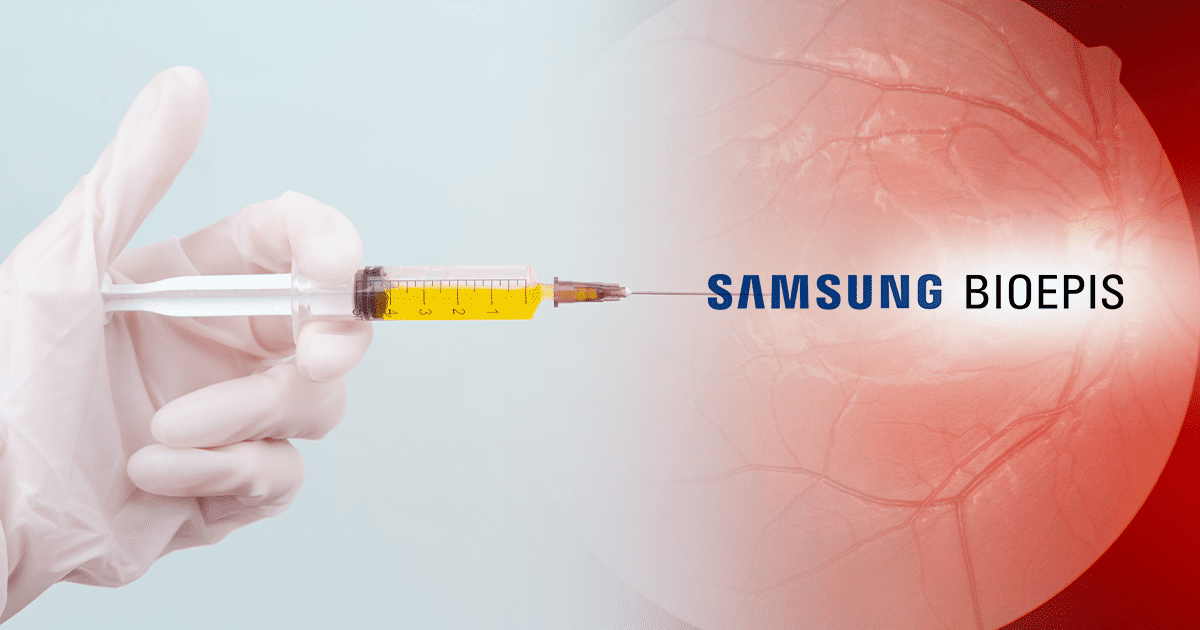Samsung Bioepis Brings Heat to Race for Anti-VEGF Biosimilars

South Korea-based Samsung Bioepis Co. has gained another leg up in the race for an anti-VEGF biosimilar to treat retinal diseases in the lucrative US and European markets with the announcement that the European Medicines Agency (EMA) advisory body has recommended approval for its Lucentis copycat Byooviz, also known as SB11, for all five ocular uses for which anti-VEGF drugs are indicated: neovascular (wet) age-related macular degeneration (AMD); diabetic macular edema (DME); proliferative diabetic retinopathy (PDR); macular edema secondary to branch or central retinal vein occlusion (RVO); and visual impairment due to choroidal neovascularization (CNV).
The EMA’s Committee for Medicinal Products for Human Use (CHMP) adopted a positive opinion for Byooviz/SB11. The CHMP’s positive opinion will now be referred to the European Commission (EC), which will decide whether to grant a marketing authorization for Byooviz. A biosimilar is a replicated version of a biological agent that may be commercialized once the reference agent comes off patent.
This action follows on the heels of the US Food and Drug Administration last fall accepting the Biologics License Application (BLA) for Byooviz/SB11 for review.
Why Activity Is Heating Up
Activity in the anti-VEGF biosimilars space has been heating up this year as a number of companies report breakthrough milestones with their programs to develop therapies that reference either Lucentis (ranibizumab, Genentech/Roche) or Eylea (aflibercept, Regeneron Pharmaceuticals). Lucentis comes off US patent this year, and loses its European patent protection in 2022, while Eylea comes off patent in 2023 in the US and 2025 in Europe.
Legislation signed by President Joe Biden may also free up the oft-maligned regulatory pathway for getting biosimilars approved in the US. The Advancing Education on Biosimilars Act requires improved federal efforts to educate the public about biosimilars. The Ensuring Innovation Act imposes more restrictions on what biologics and generic drugs qualify for product exclusivity protections.
In ophthalmology, biosimilars developers are seeking cheaper alternatives to drugs that command lucrative markets. Regeneron reported $4.95 billion in Eylea sales in 2020, which comprised 58% of its overall revenues. Bayer, ex-US distributor of Eylea, reported $3 billion in sales of that agent in 2020. Genentech’s parent, Roche, reported US sales of $1.3 billion for Lucentis last year, a decline of 16% from the previous year. Novartis, which holds ex-US Lucentis rights, reported $1.93 billion in Lucentis sales in 2020. Roche acknowledged increased competition from biosimilars as a threat to its six key therapeutic areas, which include ophthalmology.
Retina Specialist Magazine reports that the appeal of biosimilars is cost. The health information technology/clinical research company IQVIA estimates that overall savings from biosimilars could exceed $100 billion by 2024. “With an average discount range of 15 to 30% for the biosimilars thus far, these agents are expected to bring cost savings to some of the most common treatment options for neovascular age-related macular degeneration,” Sonia T. Oskouei, PharmD, vice president of biosimilars for the global healthcare services company Cardinal Health, told Retina Specialist. The cost of Lucentis and Eylea is between $1,800 and $2,000 a dose.
Biosimilars Programs in Ophthalmology
Here’s a snapshot of biosimilars in development (and the reference product) in addition to Byooviz/SB11:
- CPT-P42 (Eylea). South Korea-based Celltrion Healthcare earlier this year launched a global Phase III clinical trial of CT-P42. The trial will be conducted in patients with DME in 13 countries by the second half of 2022 to compare the biosimilar and the reference product.
- ALT-L9 (Eylea). Another South Korea-based company, Alteogen, reported in April that it successfully completed a Phase I clinical trial for ALT-L9. The trial, conducted in Alteogen’s home country, randomly assigned 28 patients with wet AMD to ALT-L9 or Eylea. The clinical trial results showed similar safety and efficacy between the agents, which Alteogen says will support its Phase III trials.
- Unnamed candidate (Eylea). Sandoz, a Novartis division, said in May it would initiate enrollment in a confirmatory Phase III trial for a biosimilar candidate of Eylea. The MYLIGHT Phase III trial will enroll 460 patients with neovascular AMD in 20 countries.
- LY9004 (Lucentis). China-based Luye Pharma Group’s Boan Biotech unit subsidiary Boan has licensed LY9004 to China-based Ocumension Therapeutics. The asset is in Phase III trials in China.
- FYB201 (Lucentis). Munich-based Formycon and partner Bioeq reported last month that they submitted the marketing authorization application to the EMA. Teva Pharmaceutical Industries, which has acquired exclusive distribution rights under a strategic partnership from Bioeq, will handle commercialization in Europe. Formycon and Bioeq previously said they intend to file with the FDA in the first half of this year.
- Xlucane (Lucentis). Bausch + Lomb entered into an agreement with STADA Arzneimittel of Germany and its development partner, Xbrane of Sweden, to commercialize this candidate in the US and Canada. STADA and Xbrane reported last month that Xlucane demonstrated comparable efficacy to Lucentis in a Phase III clinical trial.
- ONS-5010/Lytenava (Avastin/bevacizumab). Outlook Therapeutics in March reported positive safety outcomes of the NORSE THREE open-label study and says the Phase III NORSE TWO trial should report results in the third quarter this year. The company anticipates an FDA biologics license application by the end of the year.
